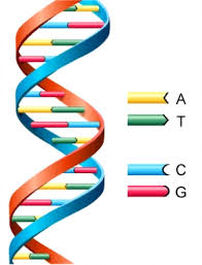Often I am faced with patients who have discovered that they have inherited a certain gene that can significantly increase their chances of acquiring a particular health condition or disease. They are petrified and are almost writing their own death sentence. Do these genes dictate their destiny? Should they start air jordan 1 high skyline writing their wills and prepare their loved ones for their demise?
While genes can give you valuable information of your tendencies and predispostion to contract certain illnesses and help explain health conditions, they DO NOT, in themselves, dictate your destiny.
Before we can adequately discuss this concept, it is firstly important to understand the basics.
Our genes are located inside each of our cells’ nuclei, in the form of DNA, a double helix structure that comprises of approximately 3 million nucleotide bases, known as adenine (A), cytosine (C), guanine (G) and thymine (T). The order and sequence of these four bases determines our life instructions, including the synthesis of the different proteins needed to carry out all our metabolic processes.
Numerous studies have shown that “epigenetics”, which is the study of heritable changes in the way genes are expressed (ie. the activation or silencing of genes) without involving alterations in the DNA sequence, can ultimately influence how genes are read by the cells and influence how our body functions. These epigenetic factors include nutrient deficiencies, our diet, how we exercise, where we live, how and when we sleep, who we interact with, medication, toxins, our diseased state, and even aging etc. While epigenetics make us unique, they can also influence whether we will express those gene mutations inherited from our parents, The good news is that epigenetics is reversible , i.e. the gene’s state can be reversed by silencing the bad and activating the good, thereby theoretically slowing the aging process, stopping obesity or the onset of cancer, and much more.
An analogy that might help you understand this concept, is if you think of your genes or DNA sequence as the blueprint of a car, dictating which parts are needed, where they should be located, how they should function and the overall look of the vehicle. However, how the car is actually constructed, and how it is used, will ultimately affect how well the car will run. Indeed, you can have many cars manufactured in the same way and off the same processing line, and not only will each one still be unique, but how it will function overall will depend on the actual assembly of the parts, the quality nike revolution 7 of the parts themselves, and the care the vehicle is given. Perhaps, during Adidas Adilette Bonega W , adidas Jacket - HY7242 , Ida-stepShops the process, there was a part used that had a slight defect. The manufacturer explains to the owner that if he services the car regularly and keeps it in top working condition, it will run efficiently. However, if the owner neglects this advice and abuses or mistreats the car, the defect will present itself, and over time, signs of deterioration (other than those due to the natural aging process) will occur.
Many patients will tell me that they do not want to know if they have inherited a certain mutation, such as the MTHFR gene that is instrumental in methylation and many other vital processes, or the Apo E4 gene that increases your chances of cardiovascular disease and Alzheimer’s. But as we can see from the above, it is highly valuable to know this information, so that we can remove some of the obstacles in our lives that can cause activation of these genes, and possible ill-health, and put in place a protocol Donald, Wears Large Shoe Size, Barron Trump Is Taller Than Melania, Puma Cali Sport chunky sneakers in white and black for improving our epigenetics and keeping these genes silenced.
If you would like to know what metabolic gene mutations you have inherited, or have already been tested and would now like to know what you can do to silence the gene mutations or polymorphisms you have, as well as improve the functioning of the enzymes that are coded by those particular genes, please do not hesitate to contact me. Also, if you have still not read my other blogs, please click here. Furthermore, I have a facebook page that not only shares some of my blogs and videos but provides valuable health information. If you gain insight from some of the contributions, don’t forget to click on the “Like” button.please click onto our website www.naturopathsolutions.com.au and contact us. Also, if you haven’t read my other blogs, and would like to read them, then click here.

